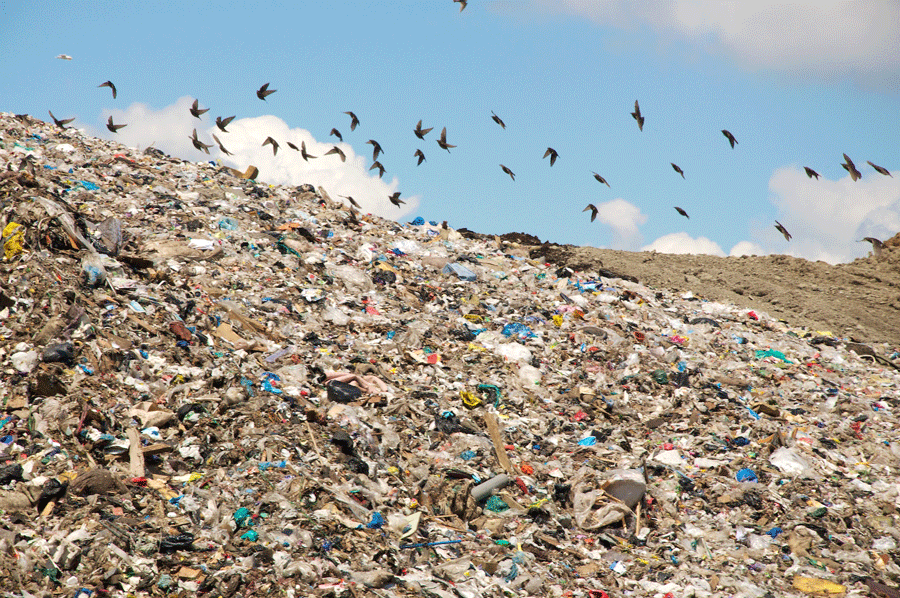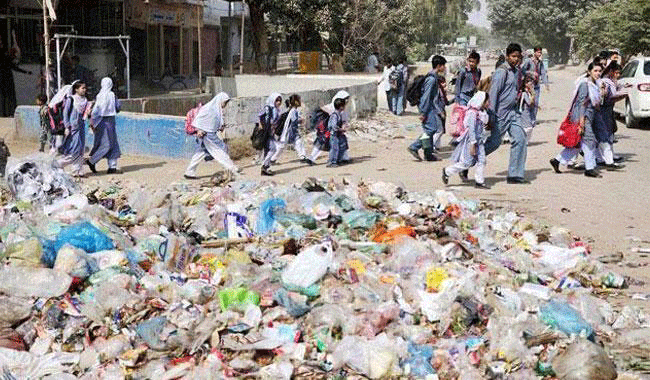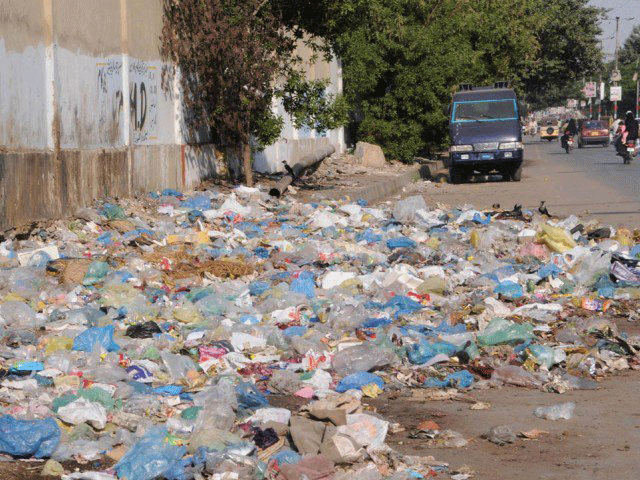The Filthy Rich City

The garbage-choked streets of Karachi present a truly dismal picture. The city produces 14,000 tons of solid waste every day. The per capita solid waste produced is about one kg. This figure is not excessively high for an industrial city like Karachi as the average for Pakistan is about 0.6 kg. The issue facing the city is not the volume of garbage but the inability of the city authorities to dispose off this garbage in a sanitary manner. The evidence of this failure stares in the face of any person who steps out of his home anywhere in the city. The fact that Karachi provides nearly 55% of the federal tax revenues of Pakistan, it is shameful, to say the least, that this goldmine is littered with filth. Three years back the tax contribution was 65% which indicates the deterioration in the economic development of Karachi due to unfavorable infrastructure conditions.
Associated with the health hazards of garbage in the residential areas is the issue of burning of garbage. Uncontrolled burning of garbage releases a huge amount of deadly toxins to the air. According to the World Health Organisation, 36% of lung cancer, 34% of stroke and 27% of heart disease is caused by air pollution.
The organisation responsible for the management of solid waste in the province of Sindh is the Sindh Solid Waste Management Board (SSWMB). The organisation was created as an act of the the Sindh Government in 2014. Previous to the SSWMB, Karachi solid waste was managed by the Karachi Municipal Corporation (KMC). The creation of this authority caused a huge resentment in KMC who feel that the decision to create SSWMB was a political move aimed at diluting the powers of the Muhajir Qaumi Movement. The KMC mayor maintains that instead of strengthening the system existing under KMC the then provincial government created a new entity which has resulted in further deterioration of the garbage disposal system. The SSWMB maintains a website http://sswmb.gos.pk/cms/. The website does not have any useful information on the volume and handling of solid waste.
There are two main garbage disposal sites in Karachi. The larger one is a 500 acre site at Jam Chakro, in the Surjani Town locality. The second site it is at an area called Gond Pass in the vicinity of the Hub River. These sites are grandly called “Landfills”. In reality these are simply dumping grounds and do not fulfill any of the international standards for a sanitary landfill. These sites are located about 30 km from the city centre. Garbage is transferred to these sites by dumper trucks. Trucks are weighed at the site before disposing off the garbage. According to estimates provided by SSWMB, about 70% of Karachi garbage is transferred to the garbage dumps. Given that in 2008 less than 4,000 tons of garbage was picked up daily, the accuracy of the current figure of 70% (or neary 10,000 tons) is a moot point and unless a detailed audit is done at the garbage dumping sites it is not possible to determine the correct amount.
After the formation of the SSWMB, it was contracted in 2016 with a Chinese company to dispose the garbage in the districts South and East at the rate of US$ 26 per ton. According to the DMC South Municipal Commissioner, previous to this contract Rs. 320 per ton was the rate being used for garbage disposal. Thus there was an increase of 8 times in the rate. Later, in 2017, two other districts, Karachi West and Malir, also signed a similar contract with two Chinese companies. According to a briefing by the SSWMB Managing Director in November 2018, steps were underway to award similar contracts for the two remaining districts Central and Korangi.
A daily garbage of 14,000 tons translates to 5.11 million tons per year. If a rate of $26 is applied to the total quantity of garbage of Karachi, it would need US$ 133 million per year. Using a conversion rate of Rs. 140 for US$, this translates to about PKR 18.6 billion per year.

The annual budget for the Sindh government for the year 2018-2019 is Rs. 1,144 Billion. Karachi, with an official population of 14.9 million out of a total of 47.9 for Sindh, accounts for 31% of the provincial population. Allocating 31% of the budget to Karachi would mean that there is Rs. 354 billion available for the city. If all of Karachi’s garbage can be disposed of for Rs. 18.6 billion, it would require 5.3% of the total budget for Karachi These figures clearly demonstrate that there is no financial constraint for keeping Karachi clean. Of course, it begs the question as to where the money for Karachi goes? One example of the cavalier fashion in which the funds are released for civic work is that a budget of Rs. 437 million was released for Nullah cleaning in one day near 30th of June, 2016; the day on which this remaining amount in the budget was lapsing.
While the annual budget for Sindh increased from Rs.530 billion in 2013-2014 to Rs.1,144 billion in 208-2019, the KMC’s budget was reduced to Rs. 27 billion from Rs. 35 billion in the corresponding period.
The issue of garbage disposal in Karachi has received attention from both the Prime Minister and the Supreme Court. When the PM visited Karachi on 15 Sept 2018 he made a promise that Karachi would be cleaned up in two months. Just five days later, on 20th Sept 2018, Mr. Saeed Ghani, the minister of Local bodies of Sindh issued a statement that the PM Imran Khan did not have the authority of issuing a warning to the Government of Sindh as garbage disposal was a provincial matter. So much for the authority of the PM of Pakistan!
The Supreme Court also tried to wave its magic wand to solve the problem of garbage disposal and garbage burning when it formed a a judicial council for water and sanitation for Karachi in 2016. The commission was headed by Justice Mohammad Iqbal Kalhoro of the Sindh High Court. In January 2018, a Retired Justice of the Supreme Court Amir Hani Muslim took over the as the head. He issued a decree that there would be no garbage in the streets and no garbage burning will be allowed. The Sindh Government promptly issued a notification to this effect in February 2018. With this notification any garbage in the streets and any garbage burning (except at landfills) became illegal by the stroke of a pen. Amen to that. Of course, nothing changed as the law was never enforced. The frustrated judge resigned in December, 2018. The term of the judicial commission ended on January 2019, thus bringing to end another abortive attempt to clean-up Karachi.
While there has been little action on this front, there has been no dearth of grand promises. Mr. Murad Ali Shah, the CM, proclaimed boldly in December 2016 that he is the man responsible for cleaning up Karachi. One had the vision of this great public servant standing shoulder to shoulder with the garbage collectors with a sack and broom in his hand. Before Mr. Murad Ali Shah, his predecessor Mr. Qaim Ali Shah had also made a similar promise in July 2018 to clean up Karachi in six weeks. When the provincial administration failed the fire breathing former Chief Justice and the Prime Minister himself made similar promises.

Sadly, even civil society seems to be indifferent to the issue of garbage disposal in Karachi. There is no organised movement to pressure the city authorities to address this serious health and hygiene issue. In a city of 15 million residents, protest is heard only from a handful. The are lone individuals like Mr. Abdul Hamid Dagia, a retired finance professional, who has dedicated his life to recording violations of the city laws related to garbage on camera and sending this evidence to the concerned authorities. It was the efforts of individuals like him that pushed the Supreme Court to form the aforementioned judicial council on water and sanitation. Unfortunately, most of Karachiites seem to have given up hope and do not get involved in social activism to improve the civic conditions in the city.
There is still nothing on the horizon to suggest that the garbage issue of Karachi will be resolved in the near future. Most attempts by the Sindh Government to perform in this area are either knee jerk reactions to the occasional noise made by the judiciary and civil society, or ill-conceived attempts at the cost of the hard working taxpayers of Karachi.
The writer is an engineer by training and a social scientist by inclination.



